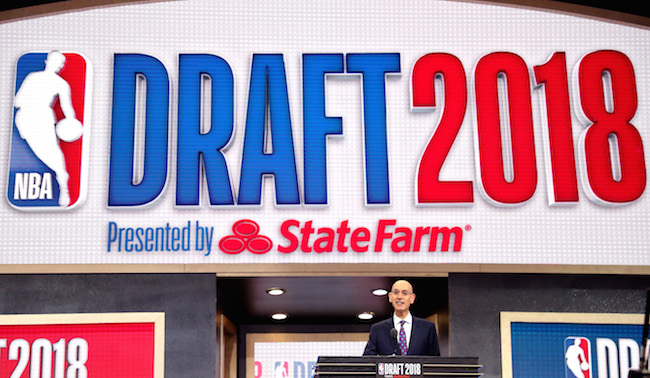
The NCAA made a major announcement on Wednesday morning when they unveiled new rules regarding basketball players entering the NBA Draft. Included in the announcement was a radical change allowing top high school and college players to hire agents while remaining eligible for college play.
The initial response was that it appeared as though, for the first time in a long time, the NCAA had done something good that benefits the players. But as more details emerged about the policy, confusion was abound. Multiple reporters began relaying information about the policy, which allows players to hire an agent, go through the draft process and combine, and return to school if they go undrafted.
The NCAA will also now allow "elite" high school and college players to be represented by an agent, while also allowing players to return to school if not selected in the NBA Draft.
— Jeff Borzello (@jeffborzello) August 8, 2018
NCAA announces it is implementing several recommendations:
– Players can be repped by agents.
– Agents must be certified by an NCAA program
– Players can be eligible for NBA Draft and return to school if undrafted.— Jeff Goodman (@GoodmanHoops) August 8, 2018
NCAA says an "elite" prospect, as identified by USA Basketball, can hire agent beginning July 1 before their senior year in high school — if/when the NBA and NCAA allow high schoolers to enter draft. College players are eligible after each season.
— Shams Charania (@ShamsCharania) August 8, 2018
There are some problems here, as many have pointed out. For one, there’s an issue with the NCAA stating the determination of what high school prospects are “elite” enough to be allowed to hire agents will be done by USA Basketball. Oh, also, USA Basketball never signed off on doing this and doesn’t want to do it.
A USA Basketball official informed me they haven't had any substantive conversations at this stage about these changes, nor have they given their approval. It sounds like the NCAA will be designating who is considered an elite prospect. USAB will then run their camp for them. https://t.co/kcuruRS5EX
— Jonathan Givony (@DraftExpress) August 8, 2018
Few are pleased w/ NCAA's handling of release. USA Basketball and the NBA were blindsided w/ NCAA dictating USAB would decide which HS players could eventually hire agents. USAB doesn't have desire or infrastructure for those evaluations. If anyone has that expertise, it's NBA.
— Adrian Wojnarowski (@wojespn) August 8, 2018
It’s spectacularly on brand for the NCAA to try and make a positive PR play with this policy only to fail to make the NBA and USA Basketball aware of it. The biggest problems with the NCAA’s policy are that it still restricts players and is still confusing regarding who can do what with strange stipulations about who is deemed good enough to deserve of this opportunity. The policy won’t go into effect until any NBA rule changes, and because of the restrictive nature of the policy as it stands now, it likely won’t effect the vast majority of players and is essentially the NCAA covering itself for when the one-and-done returns so they don’t end up being unable to bring in incoming freshmen that want to enter the draft pool before committing to a school.
Those that choose to enter the draft will have the door open to return to school, but as ESPN’s Adrian Wojnarowski noted on Twitter, players that go undrafted likely aren’t going to want to return to school because the prospects of raising their profile out of being a late second-rounder is very slim and they’ll continue to go after G League and international deals. When first announced, this was thought to be a radical change by the NCAA, but as it stands now, it appears to be a far less influential decision than most hoped.






